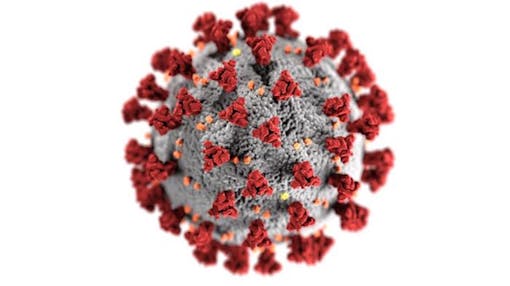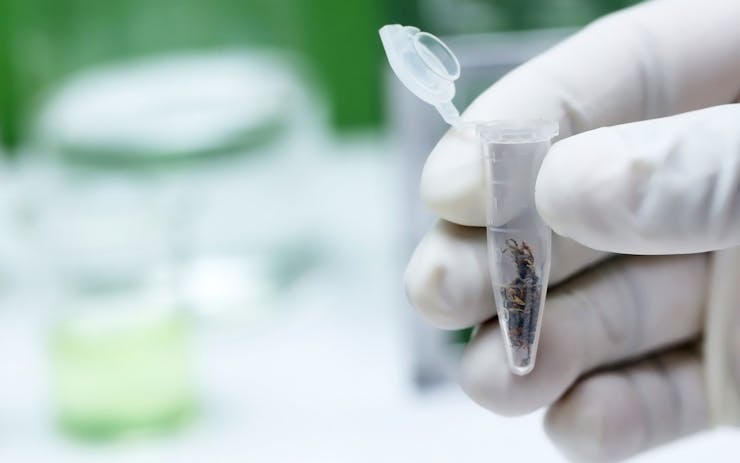In these times of coronavirus, one big question is on cannabis users’ minds: “Can cannabis cure or prevent the coronavirus… or could it make it worse?”
Researchers can’t legally just jump in a lab and start testing cannabinoids versus the coronavirus specifically. But we know cannabis has medical properties that might harm or help someone trying to avoid, or battling, SARS-CoV-2.
In fact, smoking cannabis may make people more susceptible to infection.
Only the end of federal prohibition can unlock cannabis’ multiple roles against this nasty new infectious disease, and others.
Can weed prevent the coronavirus?
Strictly speaking, we don’t have much evidence suggesting that cannabis can prevent a coronavirus infection.
In fact, smoking cannabis may make people more susceptible to infection. Dr. Donald Tashkin, a UCLA professor who has extensively studied cannabis’ effects on the lungs, previously found evidence that cannabis smoking temporarily increases the symptoms of bronchitis such as inflammation in the lungs, coughing, and phlegm production. While these effects were much less serious than those found for tobacco, Tashkin told the Los Angeles Times in April that “smoking anything increases risk.”
All the doctors we spoke with agreed that avoiding smoking is a good idea right now. “In general, I would suggest much less smoking,” advises Dr. Frank Lucido, a GP and cannabis clinician. “Since COVID-19 deaths are respiratory deaths, it’s best to avoid even cannabis smoke in this case.”
Still, if you are a patient using cannabis medicinally, and don’t find other methods of using cannabis effective, don’t panic.
“Some people need to smoke or vape it and they shouldn’t feel bad about it,” explains Dr. Peter Grinspoon, a physician, and instructor at Harvard Medical School.
He says it’s best to stop smoking, but not at the expense of your other medical needs.
Locate tested, legal edibles near you. Place an order on Leafly Finder today
Cannabis dampens inflammation
Furthermore, it appears that cannabinoids dampen the immune system’s response to a new infection. Cannabis’ immunosuppressive qualities stem from the fact that it reduces inflammation.
Shop highly rated dispensaries near you
Showing you dispensaries nearThose properties are useful in fighting some viruses that exploit inflammation to replicate. Still, it’s not clear from the research whether these immune effects would be helpful or harmful for coronavirus, but we expect to see more researchers studying it.
A new NIDA grant hopes to entice researchers to study how marijuana use changes risks associated with COVID-19.

A CDC illustration of SARS-CoV-2 the new coronavirus that causes COVID-19. (CDC)
Cannabinoids vs coronavirus comorbidities
On the other hand, cannabis has a known ability to reduce certain comorbidities of the coronavirus.
Coronavirus can be complicated by conditions like diabetes and obesity, and cannabis is associated with a reduced incidence of both.
‘We know that cannabis has profound anti-inflammatory action, but we don’t fully understand how to harness that.’
Cannabis can also help patients reduce use of alcohol, tobacco, and other drugs which can complicate coronavirus. But again, experts caution that this doesn’t mean if you go out and start smoking cannabis today, you will have a better chance of surviving coronavirus.
“I’m one of the people that believes that cannabis can help people be healthier,” explains Dr. Grinspoon. “But that’s a little bit of a circuitous argument for saying that cannabis is helpful in coronavirus.”
Calming an immune system ‘cytokine storm’
While we don’t have evidence that cannabis can cure the coronavirus, cannabis does have some disease-prevention qualities that show potential for helping rather than harming the progression of coronavirus.
Top amongst these is its ability to bring down inflammation. Researchers studying the coronavirus tell us that a big piece in the deadly cases of later-stage COVID-19 is an overactive immune response called a cytokine storm. These storms cause so much inflammation they damage the host’s own body and lead to death.
Researchers are looking at a class of drugs called IL-6 cytokine inhibitors, although the drugs currently on the market can have severe side effects. Interestingly, both CBD and THC have been shown to be able to inhibit IL-6, suggesting that they might be able to help bring down these dangerous cytokine storms.
But researchers caution that it is too early to assume that cannabis could be a treatment.
“We know that cannabis has profound anti-inflammatory action, but we don’t fully understand how to harness that, especially when it comes to treating this specific illness,” said cannabis researcher Dr. Sue Sisley.
Still, she thinks it’s worth researching these anti-inflammatory effects further—looking at both cannabis flower and cannabis root—which has also been used for reducing inflammatory effects.
Cannabinoids as antivirals?
Cannabis has also shown antiviral effects, even reducing viral infection with HIV in simian experiments. Still, some experts say cannabis would be unlikely to help with coronavirus via this antiviral route.
“Cannabis isn’t an antiviral medication,” explains Dr. Grinspoon “We don’t use it to treat viruses, we use it to treat symptoms. … It just doesn’t really function that way.”
Cannabis protects cells from low oxygen damage
Cannabis also has also shown some potential for helping with the damage of coronavirus.
Cannabinoids reduce oxidative stress, a key component of COVID-19 injury to vital organs like the heart and brain. In fact some cannabinoids are even patented for it.
Those properties may be why people with THC in their system are more likely to survive a trip to the ER for heart issues like atrial fibrillation and myocardial infarction, which are both complications found with severe cases of coronavirus.
'The fact is, it’s a new virus and there isn’t any data either way for cannabis.'
Still, despite these positive points in cannabis’ favor, cannabis researchers and doctors advise caution before assuming cannabis will help.
“People have to hold their horses and not extrapolate and not make claims that are unsubstantiated,” advises Dr. Grinspoon. “People who are anti-cannabis really want to think that cannabis harms you when you have coronavirus, and people who are pro-cannabis really want to think that cannabis helps you when you have coronavirus. But the fact is, it’s a new virus and there isn’t any data either way for cannabis.”
Bottom line: Prohibition kills needed research
That lack of data underscores the importance of dismantling federal roadblocks to research on cannabinoids for anti-inflammation, oxidative stress relief on the heart and brain, insulin resistance, and drug cessation.
For decades, federal prohibition and arcane regulations have prevented most American-based research on cannabis. Even today, American researchers can’t access the pharmacologically diverse cannabis available in open state-legal markets. Instead, their only legal source for research cannabis is a NIDA-contracted farm in Mississippi, which grows a notoriously low-potency and poor-quality crop. Until scientists can legally study cannabis—as it is actually used by consumers—it will be hard to say how it might impact coronavirus.
Seizure disorders provide a striking example of the consequences of this research gap. Before its modern medical renaissance in the 21st century, countless sick children and adults in the US perished without access to cannabidiol (CBD) for catastrophic seizures. Their doctors didn’t know about CBD, doctors couldn’t prescribe it, and patients couldn’t obtain it.
Dr. Sue Sisley said, “We should definitely be looking at the anti-inflammatory properties of cannabis more in depth.”
Not just for now, but for future pandemics as well.
For example, on April 17, Canadian researchers flagged several cannabis cultivars for potential use in reducing SARS-CoV-2 infectivity. Far more follow-up research is required, but it’s an interesting start.
“I think it is a good investment of time and resources because we know that we’re going to be facing these pandemics periodically,” said Sisley. “We need to be better prepared next time so we [end up having to do] emergency research.”





